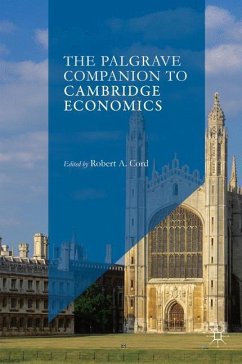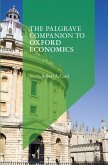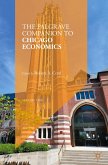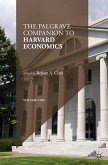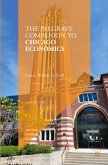The Palgrave Companion to Cambridge Economics
Herausgegeben:Cord, Robert A.
The Palgrave Companion to Cambridge Economics
Herausgegeben:Cord, Robert A.
- Gebundenes Buch
- Merkliste
- Auf die Merkliste
- Bewerten Bewerten
- Teilen
- Produkt teilen
- Produkterinnerung
- Produkterinnerung
Cambridge University has and continues to be one of the most important centres for economics. With nine chapters on themes in Cambridge economics and over 40 chapters on the lives and work of Cambridge economists, this volume shows how economics became established at the university, how it produced some of the world's best-known economists, including John Maynard Keynes and Alfred Marshall, plus Nobel Prize winners, such as Richard Stone and James Mirrlees, and how it remains a global force for the very best in teaching and research in economics. With original contributions from a stellar…mehr
Andere Kunden interessierten sich auch für
![The Palgrave Companion to Cambridge Economics The Palgrave Companion to Cambridge Economics]() The Palgrave Companion to Cambridge Economics186,99 €
The Palgrave Companion to Cambridge Economics186,99 €![The Palgrave Companion to LSE Economics The Palgrave Companion to LSE Economics]() The Palgrave Companion to LSE Economics232,99 €
The Palgrave Companion to LSE Economics232,99 €![The Palgrave Companion to Oxford Economics The Palgrave Companion to Oxford Economics]() The Palgrave Companion to Oxford Economics169,99 €
The Palgrave Companion to Oxford Economics169,99 €![The Palgrave Companion to Oxford Economics The Palgrave Companion to Oxford Economics]() The Palgrave Companion to Oxford Economics171,99 €
The Palgrave Companion to Oxford Economics171,99 €![The Palgrave Companion to Chicago Economics The Palgrave Companion to Chicago Economics]() The Palgrave Companion to Chicago Economics209,99 €
The Palgrave Companion to Chicago Economics209,99 €![The Palgrave Companion to Harvard Economics The Palgrave Companion to Harvard Economics]() The Palgrave Companion to Harvard Economics294,99 €
The Palgrave Companion to Harvard Economics294,99 €![The Palgrave Companion to Chicago Economics The Palgrave Companion to Chicago Economics]() The Palgrave Companion to Chicago Economics209,99 €
The Palgrave Companion to Chicago Economics209,99 €-
-
-
Cambridge University has and continues to be one of the most important centres for economics. With nine chapters on themes in Cambridge economics and over 40 chapters on the lives and work of Cambridge economists, this volume shows how economics became established at the university, how it produced some of the world's best-known economists, including John Maynard Keynes and Alfred Marshall, plus Nobel Prize winners, such as Richard Stone and James Mirrlees, and how it remains a global force for the very best in teaching and research in economics. With original contributions from a stellar cast, this volume provides economists - especially those interested in macroeconomics and the history of economic thought - with the first in-depth analysis of Cambridge economics.
Hinweis: Dieser Artikel kann nur an eine deutsche Lieferadresse ausgeliefert werden.
Hinweis: Dieser Artikel kann nur an eine deutsche Lieferadresse ausgeliefert werden.
Produktdetails
- Produktdetails
- Verlag: Palgrave Macmillan / Springer Palgrave Macmillan
- Artikelnr. des Verlages: 978-1-137-41232-4
- 1st ed. 2017
- Seitenzahl: 1264
- Erscheinungstermin: 28. Februar 2017
- Englisch
- Abmessung: 241mm x 160mm x 79mm
- ISBN-13: 9781137412324
- ISBN-10: 1137412321
- Artikelnr.: 44372904
- Herstellerkennzeichnung Die Herstellerinformationen sind derzeit nicht verfügbar.
- Verlag: Palgrave Macmillan / Springer Palgrave Macmillan
- Artikelnr. des Verlages: 978-1-137-41232-4
- 1st ed. 2017
- Seitenzahl: 1264
- Erscheinungstermin: 28. Februar 2017
- Englisch
- Abmessung: 241mm x 160mm x 79mm
- ISBN-13: 9781137412324
- ISBN-10: 1137412321
- Artikelnr.: 44372904
- Herstellerkennzeichnung Die Herstellerinformationen sind derzeit nicht verfügbar.
Robert A. Cord holds a PhD from Cambridge University, UK, and his areas of interest include the history of economic thought and, within this, the history of macroeconomics. His publications include Reinterpreting the Keynesian Revolution (2012) and, as co-editor, Milton Friedman: Contributions to Economics and Public Policy (2016).
Introduction; Robert A. Cord.- PART 1: THEMES IN CAMBRIDGE ECONOMICS.- Chapter 1: The Cambridge Contribution to the Revival of Classical Political Economy; Nuno Ornelas Martins.- Chapter 2: Cambridge's Contribution to Methodology in Economics; Sheila C. Dow.- Chapter 3: Cambridge Theories of Welfare Economics; Rogério Arthmar and Michael McLure.- Chapter 4: Cambridge and Development Economics; Shachi Amdekar and Ajit Singh.- Chapter 5: Cambridge and Econometrics; Jim Thomas.- Chapter 6: Cambridge in Mind: Economics and Psychology on the Cam; Vincent Barnett.- Chapter 7: Post Keynesian Economics in Cambridge; John E. King.- Chapter 8: Cambridge and Economic History; Martin Dauton.- Chapter 9: Theories Came and Went, Good Data Endured: Accounting at Cambridge; Geoff Meeks.- PART 2: SOME CAMBRIDGE ECONOMISTS.- Chapter 10: William Paley (1743-1805); A.M.C. Waterman.- Chapter 11: Thomas Robert Malthus (1766-1834); SamuelHollander.- Chapter 12: George Pryme (1781-1868); Robert A. Cord.- Chapter 13: Charles Babbage (1791-1871); Renee Prendergast.- Chapter 14: Henry Fawcett (1833-1884); Bart Schultz.- Chapter 15: Henry Sidgwick (1838-1900); Bart Schultz.- Chapter 16: Alfred Marshall (1842-1924); Neil Hart.- Chapter 17: Herbert Foxwell (1849-1936); Rogério Arthmar and Michael McLure.- Chapter 18: John Neville Keynes (1852-1949); Rita McWilliams Tullberg.- Chapter 19: John Harold Clapham (1873-1946); Martin Daunton.- Chapter 20: A.C. Pigou (1877-1947); Karen Knight and Michael McLure.- Chapter 21: Ralph George Hawtrey (1879-1975); Patrick Deutscher.- Chapter 22: Frederick Lavington (1881-1927); Peter D. Groenewegen.- Chapter 23: John Maynard Keynes (1883-1946); Donald Moggridge.- Chapter 24: Gerald Frank Shove (1887-1947); Claudio Sardoni.- Chapter 25: Dennis Holme Robertson (1890-1963); Mauro Boianovsky and Charles Goodhart.- Chapter 26: (Edward) Austin (Gossage) Robinson (1897-1993); G.C. Harcourt.- Chapter 27: Piero Sraffa (1898-1983; Alessandro Roncaglia.- Chapter 28: Maurice Dobb (1900-1976); Hans Despain.- Chapter 29: Frank P. Ramsey (1903-1930); Pedro G. Duarte.- Chapter 30: Joan Violet Robinson (1903-1983); Prue Kerr.- Chapter 31: Richard F. Kahn (1905-1989); Cristina Marcuzzo and Annalisa Rosselli.- Chapter 32: James Meade (1907-1995); Sue Howson.- Chapter 33: Nicholas Kaldor (1908-1986); John E. King.- Chapter 34: David Champernowne (1912-2000); Mauro Boianovsky.- Chapter 35: William Brian Reddaway (1913-2002); Ajit Singh.- Chapter 36: Richard Murphey Goodwin (1913-1991); K. Vela Velupillai.- Chapter 37: Richard Stone (1913-1991); Terry Barker.- Chapter 38: Polly Hill (1914-2005); Robert W. Dimand and Kojo Saffu.- Chapter 39: Phyllis Deane (1918-2012); Heinrich Bortis.- Chapter 40: Robin Marris (1924-2012); Adrian Wood.- Chapter 41: Frank Hahn (1925-2013); Robert M. Solow.- Chapter 42: Wynne Godley (1926-2010); Francis Cripps and Marc Lavoie.- Chapter 43: Robin Matthews (1927-2010); G.C. Harcourt.- Chapter 44: Luigi L. Pasinetti (1930-); Mauro Baranzini and Pier Luigi Porta.- Chapter 45: G.C. Harcourt (1931-); K. Vela Velupillai.- Chapter 46: Charles Hilliard Feinstein (1932-2004); Avner Offer.- Chapter 47: Amartya Sen (1933-); Gay Meeks.- Chapter 48: James Mirrlees (1936-); Huw Dixon.- Chapter 49: Robert Rowthorn (1939-); Paul Ormerod.- Chapter 50: Ajit Singh (1940-2015); F.M. Scherer.- Chapter 51: David Michael Garrood Newbery (1943-); Michael G. Pollitt.- Chapter 52: Anthony B. Atkinson (1944-); Stephen P. Jenkins.
Introduction; Robert A. Cord.- PART 1: THEMES IN CAMBRIDGE ECONOMICS.- Chapter 1: The Cambridge Contribution to the Revival of Classical Political Economy; Nuno Ornelas Martins.- Chapter 2: Cambridge's Contribution to Methodology in Economics; Sheila C. Dow.- Chapter 3: Cambridge Theories of Welfare Economics; Rogério Arthmar and Michael McLure.- Chapter 4: Cambridge and Development Economics; Shachi Amdekar and Ajit Singh.- Chapter 5: Cambridge and Econometrics; Jim Thomas.- Chapter 6: Cambridge in Mind: Economics and Psychology on the Cam; Vincent Barnett.- Chapter 7: Post Keynesian Economics in Cambridge; John E. King.- Chapter 8: Cambridge and Economic History; Martin Dauton.- Chapter 9: Theories Came and Went, Good Data Endured: Accounting at Cambridge; Geoff Meeks.- PART 2: SOME CAMBRIDGE ECONOMISTS.- Chapter 10: William Paley (1743-1805); A.M.C. Waterman.- Chapter 11: Thomas Robert Malthus (1766-1834); SamuelHollander.- Chapter 12: George Pryme (1781-1868); Robert A. Cord.- Chapter 13: Charles Babbage (1791-1871); Renee Prendergast.- Chapter 14: Henry Fawcett (1833-1884); Bart Schultz.- Chapter 15: Henry Sidgwick (1838-1900); Bart Schultz.- Chapter 16: Alfred Marshall (1842-1924); Neil Hart.- Chapter 17: Herbert Foxwell (1849-1936); Rogério Arthmar and Michael McLure.- Chapter 18: John Neville Keynes (1852-1949); Rita McWilliams Tullberg.- Chapter 19: John Harold Clapham (1873-1946); Martin Daunton.- Chapter 20: A.C. Pigou (1877-1947); Karen Knight and Michael McLure.- Chapter 21: Ralph George Hawtrey (1879-1975); Patrick Deutscher.- Chapter 22: Frederick Lavington (1881-1927); Peter D. Groenewegen.- Chapter 23: John Maynard Keynes (1883-1946); Donald Moggridge.- Chapter 24: Gerald Frank Shove (1887-1947); Claudio Sardoni.- Chapter 25: Dennis Holme Robertson (1890-1963); Mauro Boianovsky and Charles Goodhart.- Chapter 26: (Edward) Austin (Gossage) Robinson (1897-1993); G.C. Harcourt.- Chapter 27: Piero Sraffa (1898-1983; Alessandro Roncaglia.- Chapter 28: Maurice Dobb (1900-1976); Hans Despain.- Chapter 29: Frank P. Ramsey (1903-1930); Pedro G. Duarte.- Chapter 30: Joan Violet Robinson (1903-1983); Prue Kerr.- Chapter 31: Richard F. Kahn (1905-1989); Cristina Marcuzzo and Annalisa Rosselli.- Chapter 32: James Meade (1907-1995); Sue Howson.- Chapter 33: Nicholas Kaldor (1908-1986); John E. King.- Chapter 34: David Champernowne (1912-2000); Mauro Boianovsky.- Chapter 35: William Brian Reddaway (1913-2002); Ajit Singh.- Chapter 36: Richard Murphey Goodwin (1913-1991); K. Vela Velupillai.- Chapter 37: Richard Stone (1913-1991); Terry Barker.- Chapter 38: Polly Hill (1914-2005); Robert W. Dimand and Kojo Saffu.- Chapter 39: Phyllis Deane (1918-2012); Heinrich Bortis.- Chapter 40: Robin Marris (1924-2012); Adrian Wood.- Chapter 41: Frank Hahn (1925-2013); Robert M. Solow.- Chapter 42: Wynne Godley (1926-2010); Francis Cripps and Marc Lavoie.- Chapter 43: Robin Matthews (1927-2010); G.C. Harcourt.- Chapter 44: Luigi L. Pasinetti (1930-); Mauro Baranzini and Pier Luigi Porta.- Chapter 45: G.C. Harcourt (1931-); K. Vela Velupillai.- Chapter 46: Charles Hilliard Feinstein (1932-2004); Avner Offer.- Chapter 47: Amartya Sen (1933-); Gay Meeks.- Chapter 48: James Mirrlees (1936-); Huw Dixon.- Chapter 49: Robert Rowthorn (1939-); Paul Ormerod.- Chapter 50: Ajit Singh (1940-2015); F.M. Scherer.- Chapter 51: David Michael Garrood Newbery (1943-); Michael G. Pollitt.- Chapter 52: Anthony B. Atkinson (1944-); Stephen P. Jenkins.

